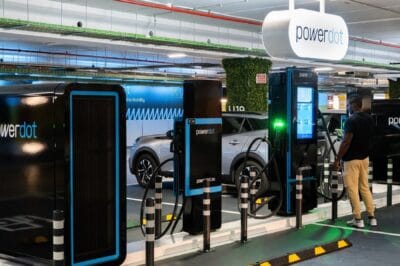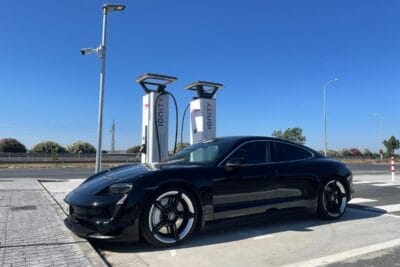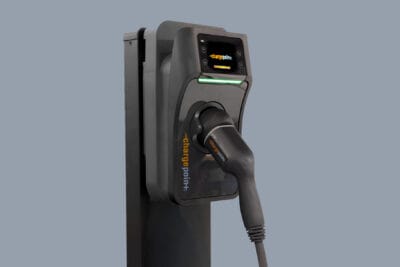Mobile DC chargers ready to go in March
The Swiss company Designwerk has introduced a new generation of mobile DC chargers. The portable DC chargers can now charge vehicles with a voltage of up to 920 volts and are targeted towards the needs of vehicle dealers and service workshops.
The Swiss company describes the chargers as “third-generation mobile chargers”. The main new feature is that the chargers now also support vehicles with higher battery voltages. The first production car with 800-volt technology is the Porsche Taycan. Still, others have been announced – for example, by Audi (with Porsche technology), but also by Hyundai based on the new e-platform e-GMP. Of course, higher voltages are also now being used in commercial electric vehicles as well.
Two models (MDC44-920 and MDC22-500) with 44 and 22 kW charging power respectively are already in production and are scheduled for delivery from March 2020. Designwerk is already taking orders. A version with 88 kW charging power is already being planned.
The mobile DC chargers are designed to enable charging during trials, tests or in workshops, regardless of location. According to Designwerk, the devices can draw their power from “common and widespread industrial sockets” and can charge vehicles with the charging standards CCS Type 1 and 2, CHAdeMO and the Chinese GB/T standard. Their advantage: Even with a CEE32 socket as input current, the vehicles can be charged at over 20 kW thanks to the conversion to direct current – and thus faster than with alternating current from the CEE32 connection, because only very few electric cars can currently charge 22 kW AC.
Here are a few examples: A Porsche Taycan with its 90 kWh battery is fully charged in 7:15 hours with the standard AC onboard charger. Designwerk specifies a charging time of 1:50 hours with the mobile 44-kW charger. A truck like the Futuricum Logistig 26E XXL with 578 kWh thus charges in 11:35 hours instead of 23:05 hours with the 22-kW AC charger. With the mobile 22 kW charger, the charging time of a Hyundai Ioniq Elektro (before the facelift, i.e. with 28 kWh) drops from 6:45 hours to 1:05 hours. A Tesla Model 3 Long Range charges in 1:40 hours instead of 3:20 hours. For the Opel Ampera-e with a 60 kWh battery and single-phase AC charger, the difference is particularly large with 2:20 hours to 14:20 hours.
To cover the higher voltage range and to ensure supplier reliability, the power electronics were newly developed and converted to silicon carbide semiconductors. Besides, the chargers now use air instead of water cooling, which is intended to increase efficiency in a more compact design – an advantage for mobile applications.
For the 22 kW DC charger, a CEE socket with 32 amps and 400 volts is sufficient, so the MDC22-500 can deliver 21 kW at up to 500 volts at the CCS connector (the other variants will follow later). To enable the more powerful MDC44-920 to achieve its full output power of 42 kW at 500 to 1,000 volts, it requires a CEE63 socket. Designwerk has not yet published the technical data for the planned 88 kW version.
Reporting by Sebastian Schaal, Germany.
designwerk.com (in German)





0 Comments